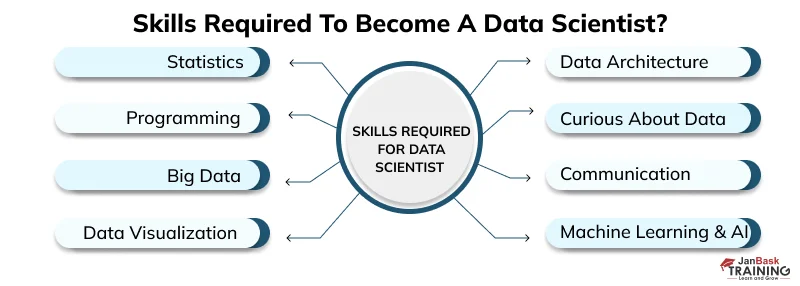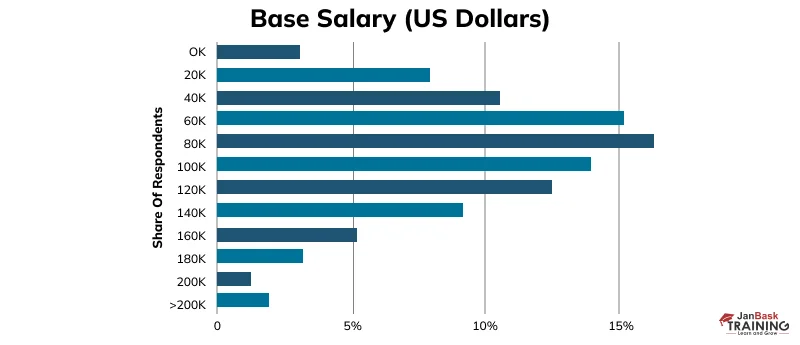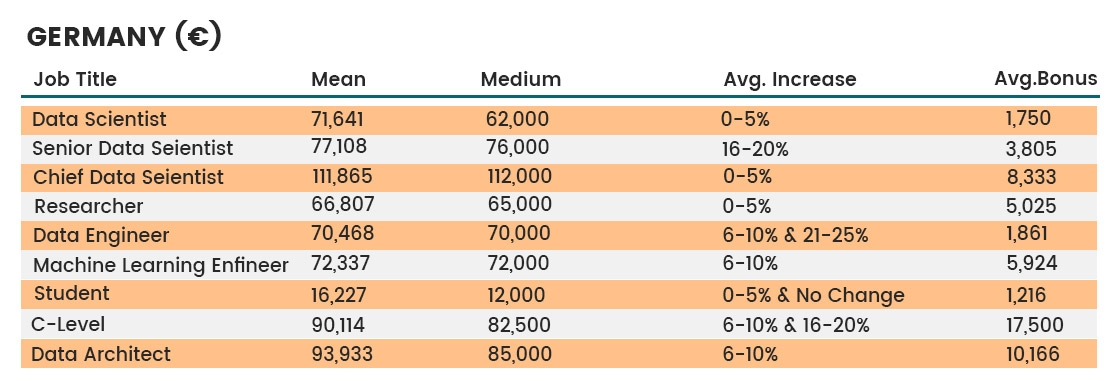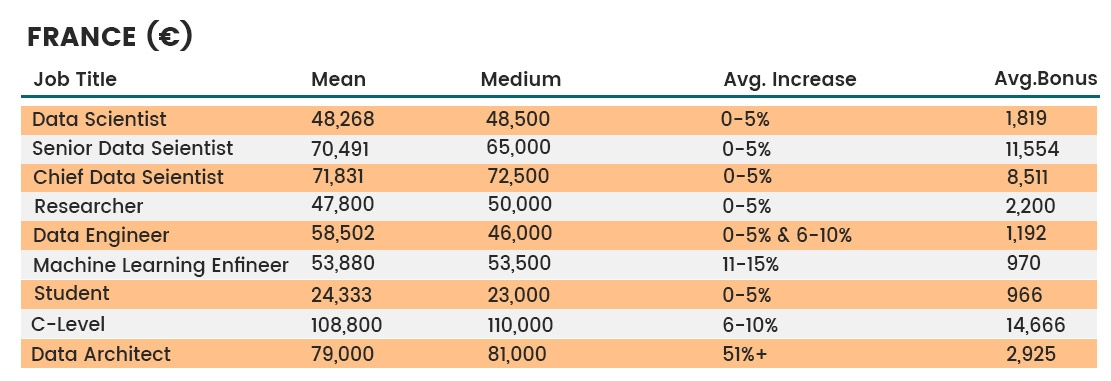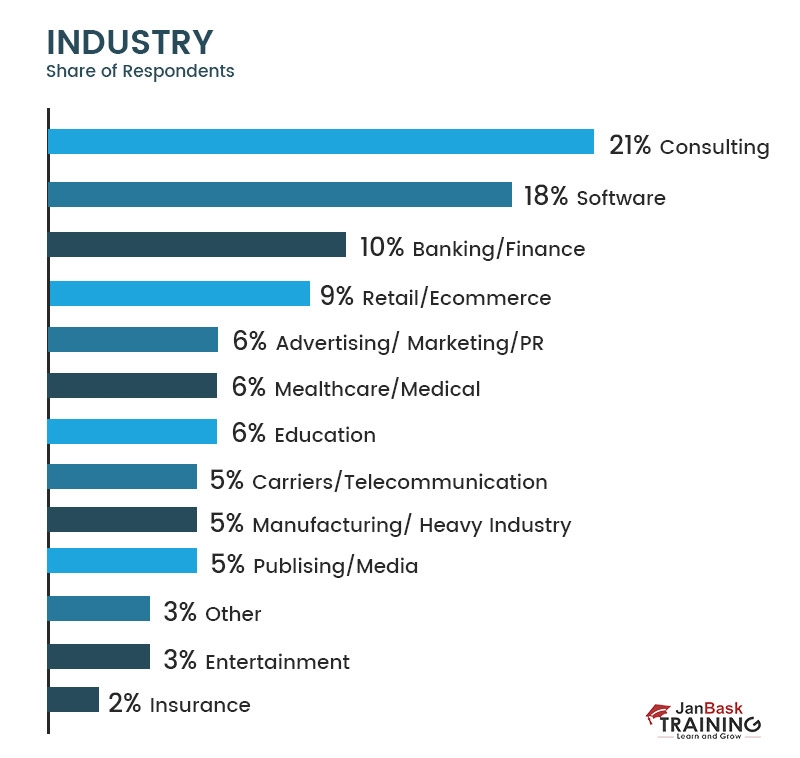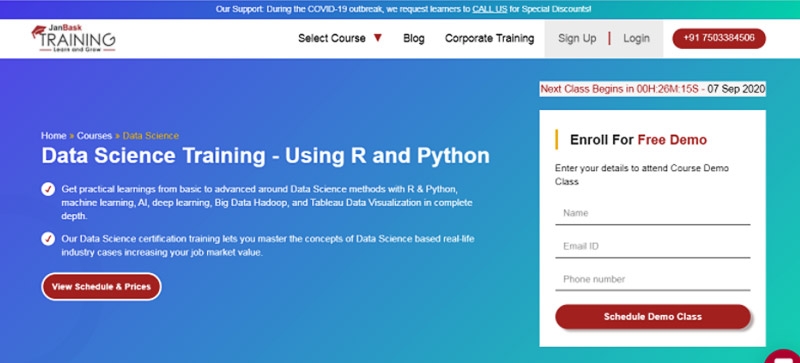Introduction
As per the U.S. Bureau of Labor Statistics, data scientist job roles are expanding at a skyrocketed pace, with a forecasted 35% growth by the year 2032. With a whopping median package of $131,490, it seems to be the ideal time to start researching the Data Science career path and get into this booming realm with a data science Certification. This is one of the compelling reasons why professionals seek answers to the question of how to become a data scientist and be successful.
With:
- 2.5 quintillion bytes of data are produced every day.
- Data Scientist is considered as the most lucrative job title of the 21st century.
- 40 zettabytes of data to be produced by 2020 and beyond.
- Data Scientist salaries for job postings in the US are 80% higher than average salaries for all job postings nationwide.
- The U.S. leading the Data Science market.

It is made evident that now is the best time to build a career in Data Science. And to help aspirants and job seekers explore how prolific it would be to make a career in data science we’ll be talking at length on the topic here. We will inform and educate aspirants on how they can shape their career trajectory in the 4 biggest Data Science roles --- keep rolling to find that out!
Let’s give you a complete hawk-eye expanse of what kind of Data Science tools, skills, and capabilities you should be equipped with before entering the relevant workforce. Learn in detail how to become a data scientist. But before that, let’s offer you a brief idea of the job role, and who is a data scientist.
Who is a Data Scientist?
It is not untrue to say that a Data Scientist is an analyst, data visualizer, and business intelligence expert - they are pretty much made of different work profiles (about which you know later on).
In a general context,
“Data Scientist is a transformation expert cum problem-solver who is part mathematician, part Computer Scientist, and part business trend spotter who bestrides both the IT and the business worlds.”
- Data Scientist collects, analyze, and interpret large volumes of data to improve a company’s operations.
- Develops statistical models to analyze data and detect trends, patterns, and relationships in data sets. To help businesses predict consumer behavior & analyze business and operational risks.
Data Science is integrated with industries across all the tasks related to IT and non-IT sectors. That’s why Data Scientists are expected to acknowledge a broader set of skills with more cohesive specialization and collaboration. The Data Science career path is, of course, very exciting. Once you gather an extensive idea of how to build a successful career in data science, you’ll start admiring the versatility of the domain.
Entry-level data science roles
Let’s start with entry-level roles. Data science career paths are becoming popular day by day. In entry-level positions, data scientists typically carry out assignments given to them by lead and senior scientists. In these positions, learning, pursuing interests, and honing analytical abilities are the main objectives. Now is also the ideal moment to improve your technical proficiency using R and Python.
Soft skills are particularly crucial for entry-level jobs. In the end, a lot of the tasks a data scientist performs on a daily basis are technical abilities that can be learned. Demonstrating your ability to collaborate with others, learn new things easily, actively listen, and speak clearly are all essential. These abilities are crucial for advancing in the workplace.
Mid-level Data Science roles
With an extra dose of seniority and ownership, mid-level data scientist employment may contain many of the same tasks or responsibilities as entry-level ones. In mid-level roles, you should be able to identify the best course of action for solving problems and demonstrate a deeper awareness of how the company may use data to overcome challenges.
Senior -Level Data Science Roles
Senior data scientist roles require a high degree of ownership and experience in directing projects and handling emergencies. Additionally, you must demonstrate your ability to assemble and manage a skilled group of engineers, analysts, and data scientists.
Senior data scientists must also bridge the gaps between the technical, analytical, and business components of data science and effectively communicate findings to stakeholders. They frequently collaborate with C-suite executives and other business leaders. The data science career path is quite rewarding. You can learn more about how to become a successful data scientist in this blog.
Skills Required for Data Scientists
To break into the field of Data Science, aspirants are required to have hard skills like data analysis, machine learning, statistics, data visualization, Hadoop, etc. Along with soft skills like critical thinking, problem-solving, persuasion, communication, and good listening skills.

Top 10 skills Data Scientists are expected to have ingrained
To make Data Science a career, you need to hone the following few skills!
|
Skill
|
Scope of that Skill
|
|
Probability & Statistics
|
- To explore and understand more about the data.
- Identify the underlying relationships or dependencies that may exist between two data variables.
- Predict future trends based on previous data trends.
- Determine the motive/patterns of the data.
- Uncover anomalies in data.
|
|
Multivariate Calculus & Linear Algebra
|
Data Science models are built with several predictors or unknown variables. Knowledge of multivariate calculus helps with building a machine-learning model.
|
|
Programming, Packages, and Software
|
- Having programming Skills for Data Science brings together all the fundamental skills required to transform raw data into actionable insights.
- There is no specific rule about the selection of programming languages, but Python and R are the most favored languages trusted for data analysis.
|
|
Database Management
|
- Database Management consists of a group of programs that edit and manipulate the databases.
- Database management systems (DBMS) are made for data from an application and guide the operating systems to provide specific required data.
- In large systems, a DBMS helps users in storing and retrieving data at any given point in time.
|
|
Data Wrangling
|
- Data Wrangling is the process of preparing given data for further analysis --- transforming and mapping raw data from one form to another to prepare the data for insights.
- In data wrangling, you acquire data, combine relevant fields, and then cleanse it for more clarity processing.
|
|
Data Visualization
|
- Data Visualization is the graphical representation of the findings from the data under consideration.
- Histograms, Bar charts, Pie charts, Line plots, Time series, Relationship maps, Heat maps, Geo Maps, 3-D Plots, and more are means to visualize the data.
|
|
Machine Learning / Deep Learning
|
|
|
Microsoft Excel
|
- Best editor for 2D data.
- A platform for advanced data analytics.
- Gives a live connection to a running Excel sheet in Python.
- Data manipulation is quite easy.
- You can do whatever, whenever you want, and save as many versions as you prefer.
|
|
Cloud Computing
|
- For data acquisition from the cloud.
- For data mining [Exploratory Data Analysis (EDA), summary statistics.
- For parsing, munging, wrangling, transforming, analyzing, and sanitizing data.
- For validating and testing predictive models, recommender systems, and more such models.
- For tuning the data variables and optimizing model performance.
|
|
DevOps
|
- To provision, configure, scale, and manage data clusters.
- To manage information infrastructure by continuous data integration, deployment, and monitoring.
- To create scripts for automating the provisioning and configuration of the foundation for diverse environments.
|
Data Science Career Prospects - Diverse Biggest Roles
With more and more companies spanning all sectors adopting Data Science and Analysis, they are hiring Data Scientists by hordes.
In the Analytics ecosystem, 70% of the job postings are for data scientists with less than 5 years of work experience.
Though Data Science requirements are intense, companies are inefficient at meeting the shortfall in talent. It is either because the aspirants aren’t aware of the benefits of approaching a future-proof Data Science career path or they don’t know how to.
In the latter half of the post, you will know the reasons why you should take a Data Science career path and how.
To bring clarity, here are the “big four” Data Science profiles that you can get into.
1. Data Scientist
Now the question arises, what exactly does a Data Scientist do? Well, they skillfully translate a business case into great analytics by understanding data and exploring patterns to gauge what impact they can/will have on business products or activities.
They use business analytics to explain what aftermath the data is going to have on a company in the future and even help in planning & implementing solutions that will help the company restore its stability and growth.
Role of Data Scientist:
- To unlock the insights of data and tell a complete story or trend via the data.
- Data Scientists in modern workplaces build machine learning models for the prediction of datasets, find possible patterns & trends in data, visualize data for better understanding, and pitch in for improvement strategies.
Required Skill Set: They should know about/have Statistics, Data Modelling, Mathematics, Python for data science or R programming, Database skills, Visualisation/BI, Presentation Skills, and Business acumen. A data science course is often necessary.
2. Data Analyst
Data Analysts collect, process, and perform statistical analyses on given large datasets from various sources to help businesses improve products & decisions. They identify how data can be used to solve the business’s problem statements. You can become a data analyst with an online master data science course.
Role of Data Analyst:
- To gather the company’s data & generate actionable insights upon which the C-suite can take action.
- The interesting thing about Data Analysts’ jobs is that their projects usually change from time to time. For 3 months, they will be required to work with the marketing department, for next maybe production, and so on.
Required Skills - Knowledge of Data Modelling, Python & R Programming, Tableau Business acumen, Database Cleansing skills, Visualisation/BI, and Presentation skills.
3. Data Engineer
Data Engineers are the data people who prepare the “big data” infrastructure for analysis by Data Scientists. They are engineers who design, build, and integrate data from various resources and manage big data. You have to follow certain steps to become a data scientist.
Role of Data Engineer:
- Since Data Engineers work with the company’s core data infrastructure, they are required to have deep knowledge of programming skills.
- In most organizations, a data engineer is required to build data pipelines and correct the data flow to ensure that data reaches the relevant departments.
Skills required: Database management, data cleaning, Python & R programming, Hadoop for data processing, Business acumen, Visualisation/BI, Presentation skills, Database cleaning skills.
Data Science Training - Using R and Python
- No cost for a Demo Class
- Industry Expert as your Trainer
- Available as per your schedule
- Customer Support Available
4. Business Intelligence Developer
BI or business intelligence developer is an engineer who develops & maintains BI interfaces. With query tools, ad hoc reporting, data visualization & interactive dashboards, & data modeling tools.
Role of Business Intelligence Developer:
- A BI developer role requires researching and planning solutions for existing problems within the company.
- They are also responsible for building OLAP (online analytical processing).
- They also work with databases, both relational and multidimensional.
Required Skillsets: Python & R programming, Hadoop, creating models, Github, Notebook, data model, Business acumen, Visualisation/BI.
Latest Data Scientists Salary Trends
For 2024, according to Glassdoor scientists come with an average annual salary of $157,153 along with a job satisfaction rate of 4.0.
Data Science Salary in the United States
- As per Indeed, the annual average Data Science salary is $123,785, and $113,436 as per Glassdoor.
- Entry-level professionals can earn between $50,000 to $90,000 (depending on your prior background, education, location, etc).

Data Scientists Salary in Diverse Locations
Wondering where a Data Scientist can relocate for a new job? Here are the few places that provide the highest data analytics salary on offer.






Industries Where Data Scientists are Hired

Banking, consulting, and software are the biggest industries with demand for Data Scientists as they have voluminous data to be interpreted. The data scientist career path is the most sought-after these days.
Demand for Data Scientists by Top Brands
Regardless of the current state of most industries, data will keep on generating, and there will always be a need for someone to make sense of it. The current situation might have put a damper on a lot of companies’ hiring plans, but out in the void, there are still quite a few top companies hiring Data Scientists incessantly. This is why you can easily make a successful career in data science. Let's get to know about the companies!
-
Adobe - A computer software MNC, creating multimedia & creativity software products, recent foray towards digital marketing software.

Data Science Consultant - $75,000-$130,000
-
Amazon - A composition of e-commerce, cloud computing, digital streaming, and artificial intelligence solutions.

Data Scientist – EU Workforce Staffing - $90,000-$165,000
-
Aetna - Leading diversified healthcare benefits companies, serves approx 46.7 million people with information & readable resources to help make better lifestyle & health-based decisions.

- Lead Data Scientist-Member Analytics - $150,000-$235,000
- Principal Data Scientist-Clinical Products -$167,000 – $180,000
-
Apple - Designer, developer, and seller of consumer electronics, computer software, and online services patented at Mac.

Data Scientist, Power and Performance- $89,000 - $144,000
-
Bloomberg - Global IT company, that uses its dynamic network of data, ideas, and analysis to solve everyday complex problems.

Senior Data Scientist – Enterprise Risk Management - $49,000-$107,000
-
CVS Health- An American healthcare company owning a CVS Pharmacy, a retail pharmacy chain, a pharmacy benefits manager, Aetna, a health insurance provider, out of many brands.

- Senior Data Analyst - $71,000-$99,000
- Analytics, Lead Data Engineer - $67,000-$115,000
-
Bose - A manufacturing company of audio equipment like speakers, headphones, and headsets.

- Business Data Analyst - $75,000-$108,000
- Senior AI, Machine Learning and Data Science Leader - $91,000-$147,000
-
Procter & Gamble - An American multinational corporation for consumer goods.

- Data Scientist - $97,000-$154,000
- Data Scientist- Supply Chain Analytics - $100,000-$123,000
-
Spotify - Popular music streaming service with a community of 217m active users, across 79 markets.

-
Uber - Popular ride-hailing company offering ride service hailing, ride-sharing, food delivery, and a micro-mobility system to commuters.

- Sr Manager, Data Science- Maps and Uber AI - $77,000-$157,000
- Sr Data Scientist – Transit - $157,000-$195,000
How to Pave a Career Path for Data Science?
How to get into data science? With Data Science Syllabus and Data Analytics becoming a crucial part of most organizations, the discipline has attracted wide attention amongst IT professionals & engineering graduates.
The application of Data Science, Data Analytics, big data, programming, and coding has added to the curiosity & learning interests of students from the STEM (Science, technology, engineering, and mathematics) backgrounds, who want to upskill around big data and its business applications.
Data Science career is increasingly becoming popular. Even 71.6% of the aspirants have said that they want to study Data Science via an online training program which is better than in-person training. Want to pave a career path in Data Science & Analysis? Here are the 3 steps to go about it.
Step 1-- Data Science Certification Training
To get familiarity with the industry-demanded data analysis skills, it is best to join an online Data Science Training program that has real data scientists to teach, real projects to establish skills for real fields, a smart dashboard with diverse study materials to keep learning interesting and purposeful, and Data Science certification & jobs assistance.
Why should I join the Data Science Training online?
- Experts around to take on doubts
- Competent syllabus & study resources
- Exclusive preparation for Data Science Certification exams
- No prerequisite to joining the training
- Free demo & counseling to test what you’ll get
- Interview & job application support
- And much more…

Step 2 - Qualify the Data Science Certifications
Seeking the industry-demanded certifications will help in validating your skills. However, certifications are optional and shouldn’t be the milestones. But if you plan to approach it along with a rigid skillset, you will get the preference in the hiring rounds and will even have weightage in demanding the desired salary.
The Data Science Certifications you can approach after ending the training:
- Apache Hadoop certifications
- Certified Health Data Analyst
- Data Science EMC Proven Professional
- IBM Cognos Business Intelligence certifications
- Microsoft Certified Solutions Associate
- Microsoft Certified Solutions Expert
- Oracle Database 11g Administrator Certified Associate
- Oracle Database 11g Administrator Certified Professional
- SAS Certified BI Content Developer
- SAS Certified Predictive Modeller
- SAS Certified Statistical Business Analyst
Data Science Training - Using R and Python
- Personalized Free Consultation
- Access to Our Learning Management System
- Access to Our Course Curriculum
- Be a Part of Our Free Demo Class
Step 3 - Take industry projects/internships
After completing the training and earning the certification, it is best to work on the industry’s part-time projects or internship programs to gain a taste of real work. This will add a lot to your portfolio and will help in eradicating the fresher badge. This is an important step in the data science career path.
When you are done with the projects, and internships, create a stellar data scientist resume, and start reaching out to real full-time Data Science profiles.
So this was the complete guide about a career path in Data Science --- understand it and proceed accordingly!
Final Thoughts on Complete Data Science Career Path!
Paving a career path in Data Science is a great deal if you are looking for a job that pays heavily, constantly evolves, has immense scope for growth, and allows climbing up the ladder.
Data Scientists are paid heavily as there is a shortfall in talent supply. Companies are extremely open to offering desired salary packages now to individuals who show up with the right skills & certifications. A Data Scientist career is one of the most lucrative these days.
And to get the right skills and certifications, self-taught learning journeys won’t be sufficient, you would need the upper hand from professional training online --- to get one-hood preparation right from syllabus preparation to job interview preparation. Choose the right data scientist course.
If you are unsure of opting for Data Science as a career path, there is the best way to find out about that --- a free demo class or career counseling!
FAQs
Q1.) What skills do data scientists need?
Strong problem-solving abilities are essential for data scientists to succeed in their positions. They need to be able to recognize trends in data sets and think critically. To modify data, they also need to be knowledgeable in statistical software and computer languages. A good data scientist course online will help a lot in pursuing a successful career in data science.
Q2.) What are the career opportunities for data scientists?
Data Science Career Path is in high demand and so are Data scientists with excellent career possibilities. The field is expanding quickly. Healthcare, banking, retail, manufacturing, and other businesses employ data scientists with the requisite training and expertise.
Q3.) What are the common tasks that Data Scientists perform?
Data scientists frequently work on organizing and cleansing data collections, doing statistical studies, and producing data visualizations. They could also be in charge of doing research and developing predictive models.
Q4.) What are some of the common challenges faced by data scientists?
Working with large data sets, intricate algorithms, and data visualization are a few of the typical difficulties faced by data scientists. They would also have to explain their findings to audiences who are not technical.
Q5.) Is Data Scientist an IT job?
Data scientists need to be very knowledgeable about both the technical and business aspects of data science in order to succeed. Ultimately, everything depends on how you describe an IT role as a "data scientist." Nonetheless, data science is an important area closely associated with the IT industry.
Q6.) Is it hard to become a data scientist?
It depends. It might be challenging to get into a data science degree because it requires a strong foundation in math, statistics, and computer programming. But anyone who puts in the necessary time and effort can learn the skills and information needed to succeed in this field. It is in almost every budding professional’s wish who are in the tech sector as to how to become a data scientist.
Q7.) Can an average student become a data scientist?
If you have a strong knowledge of algorithms, you can easily build data processing models. However, even if you don't have strong coding knowledge and a special degree in data science, you can still become a data scientist. With good learning capability, you can be a data scientist without a degree in it. It is certainly a question amongst youngsters and aged professionals alike: how to get into data science?
Q8.) Which degree is best for a data scientist?
Among data scientists today, computer science is generally at the top. Math and statistics are also becoming popular among recruiters. Naturally, this also has to do with the increased degree of technical proficiency required to use languages like R and Python. The Data Scientist career path is now one of the most sought-after career paths.
Data Science Course
Upcoming Batches
Trending Courses
Cyber Security
- Introduction to cybersecurity
- Cryptography and Secure Communication
- Cloud Computing Architectural Framework
- Security Architectures and Models
Upcoming Class
-1 day 02 Jan 2026
QA
- Introduction and Software Testing
- Software Test Life Cycle
- Automation Testing and API Testing
- Selenium framework development using Testing
Upcoming Class
-1 day 02 Jan 2026
Salesforce
- Salesforce Configuration Introduction
- Security & Automation Process
- Sales & Service Cloud
- Apex Programming, SOQL & SOSL
Upcoming Class
3 days 06 Jan 2026
Business Analyst
- BA & Stakeholders Overview
- BPMN, Requirement Elicitation
- BA Tools & Design Documents
- Enterprise Analysis, Agile & Scrum
Upcoming Class
6 days 09 Jan 2026
MS SQL Server
- Introduction & Database Query
- Programming, Indexes & System Functions
- SSIS Package Development Procedures
- SSRS Report Design
Upcoming Class
6 days 09 Jan 2026
Data Science
- Data Science Introduction
- Hadoop and Spark Overview
- Python & Intro to R Programming
- Machine Learning
Upcoming Class
-1 day 02 Jan 2026
DevOps
- Intro to DevOps
- GIT and Maven
- Jenkins & Ansible
- Docker and Cloud Computing
Upcoming Class
-1 day 02 Jan 2026
Hadoop
- Architecture, HDFS & MapReduce
- Unix Shell & Apache Pig Installation
- HIVE Installation & User-Defined Functions
- SQOOP & Hbase Installation
Upcoming Class
-1 day 02 Jan 2026
Python
- Features of Python
- Python Editors and IDEs
- Data types and Variables
- Python File Operation
Upcoming Class
0 day 03 Jan 2026
Artificial Intelligence
- Components of AI
- Categories of Machine Learning
- Recurrent Neural Networks
- Recurrent Neural Networks
Upcoming Class
14 days 17 Jan 2026
Machine Learning
- Introduction to Machine Learning & Python
- Machine Learning: Supervised Learning
- Machine Learning: Unsupervised Learning
Upcoming Class
6 days 09 Jan 2026
Tableau
- Introduction to Tableau Desktop
- Data Transformation Methods
- Configuring tableau server
- Integration with R & Hadoop
Upcoming Class
7 days 10 Jan 2026


